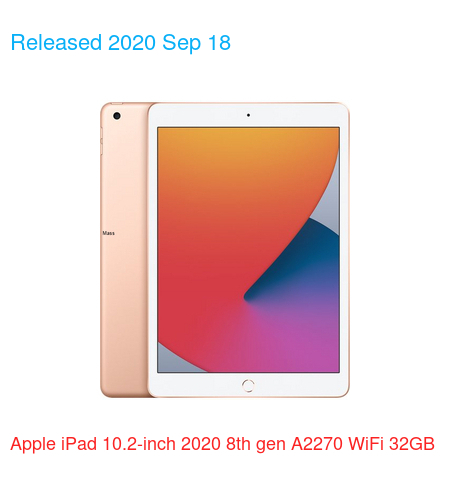| Brand | Apple |
| Model | iPad 10.2-inch 2020 8th gen A2270 WiFi 32GB |
| Released | 2020 Sep 18 |
| Announced | 2020 Sep |
| Hardware Designer | Apple |
| Manufacturer | Foxconn |
| Codename | Apple iPad 11,6 |
| OEM ID | J171aAP |
| General Extras | Active stylus |
| Device Category | Tablet |
| Width | 174.1 mm |
| Height | 250.6 mm |
| Depth | 7.5 mm |
| Dimensions | 6.85×9.87×0.30 inches |
| Mass | 490 g |
| Platform | iOS / iPadOS |
| Operating System | Apple iPadOS 14 |
| Software Extras | Voice Command , Navigation software , Augmented Reality (AR) , Intelligent personal assistant |
| CPU Clock | 2496 MHz |
| CPU | Apple A12 Bionic APL1081 / APL1W81 (T8020), 2018, 64 bit, hexa-core, 128 Kbyte I-Cache, 128 Kbyte D-Cache, 8192 Kbyte L2, 7 nm, Apple A12 GPU |
| RAM Type | LPDDR4x SDRAM |
| RAM Capacity (converted) | 3 GiB RAM |
| Non-volatile Memory Interface | Yes |
| Non-volatile Memory Capacity (converted) | 32 GB ROM |
| Display Diagonal | 259 mm |
| Resolution | 1620×2160 |
| Horizontal Full Bezel Width | 18.7 mm |
| Display Area Utilization | 73.8% |
| Pixel Density | 265 PPI |
| Display Type | Color IPS TFT LCD display |
| Display Subtype | Retina Display |
| Number of Display Scales | 16.8M |
| Display Refresh Rate | 60 Hz |
| Scratch Resistant Screen | Yes |
| Graphical Controller | Apple A12MP4 |
| A/V Out | Yes |
| Microphone(s) | stereo |
| Loudspeaker(s): | stereo |
| Audio Output: | 3.5mm |
| Supported Cellular Bands | No |
| Sec. Supported Cellular Networks: | No |
| Touchscreen Type | Capacitive multi-touch screen |
| Keyboard | Attachable QWERTY |
| Expansion Interfaces | No |
| USB | USB 3.0 / 3.1 Gen 1 / 3.2 Gen 1×1 |
| USB Services | USB charging , USB Host , USB OTG 1.3 , USB OTG 2.0 , USB PD |
| USB Connector | Proprietary |
| Bluetooth | Bluetooth 4.2 |
| Wireless LAN | 802.11a , 802.11b , 802.11g , 802.11n , 802.11ac |
| Wireless Services | AirPlay , Wi-Fi Calling |
| NFC | NFC A , NFC B |
| FM Radio Receiver | No |
| Camera Placement | Rear |
| Camera Image Sensor | BSI CMOS |
| Number of effective pixels | 8.0 MP camera |
| Aperture (W) | f/2.40 |
| Zoom | 1.0 x optical zoom |
| Focus | CD AF |
| Video Recording | 1920×1080 pixel |
| Flash | No |
| Camera Extra Functions | EIS , EIS (video) , HDR photo , HDR video , Slow motion video , Burst mode , Touch focus , Macro mode , Panorama Photo , Face detection |
| Aux. Camera Image Sensor | No |
| Aux. 2 Camera Image Sensor | No |
| Aux. 3 Camera Image Sensor | No |
| Aux. 4 Camera Image Sensor | No |
| Secondary Camera Placement | Front |
| Secondary Camera Sensor | BSI CMOS |
| Secondary Camera Number of pixels | 1.2 MP sec. cam |
| Secondary Aperture (W) | f/2.40 |
| Secondary Video Recording | 1280×720 pixel |
| Secondary Camera Extra Functions | HDR photo , HDR video , Burst mode , Face detection |
| Sec. Aux. Cam. Image Sensor | No |
| Built-in compass | Yes |
| Built-in accelerometer | 3D accelerometer |
| Built-in gyroscope | 3D gyro |
| Additional sensors | Barometer , FP sensor , L sensor |
| Protection from solid materials | Yes |
| Protection from liquids | Yes |
| Battery | Li-ion polymer (LiPo) |
| Nominal Battery Voltage | 3.73 Volts |
| Nominal Battery Capacity | 8686 mAh battery |
| Nominal Battery Energy | 32.40 Wh |
| Estimated Battery Life | 10.0 hours |
| Market Countries | Algeria , Argentina , Armenia , Australia , Austria , Bangladesh , Belarus , Belgium , Bolivia , Brazil , Bulgaria , Cambodia , Canada , Chile , China , Colombia , Costa Rica , Croatia , Cyprus , Czech , Denmark , Ecuador , Estonia , Egypt , Finland , France , Greece , Germany , HK , Hungary , India , Indonesia , Ireland , Israel , Italy , Japan , Jordan , Kazakhstan , Kenya , Kuwait , Latvia , Lebanon , Lithuania , Malaysia , Mexico , Morocco , Mongolia , Myanmar , Nepal , Netherlands , Nicaragua , Nigeria , Norway , NZ , Panama , Pakistan , Paraguay , Peru , Philippines , Poland , Portugal , Puerto Rico , Russia , Romania , Saudi Arabia , Serbia , Singapore , Slovakia , Slovenia , South Africa , South Korea , Spain , Sri Lanka , Sweden , Switzerland , Taiwan , Tanzania , Tunisie , Thailand , Turkey , UAE , Uganda , UK , Ukraine , USA , Uzbekistan , Vietnam |
| Market Regions | Africa , Asia , Australia , Central America , Eastern Europe , Europe , Middle East , North America , Oceania , South America , Southeast Asia , Western Europe , Worldwide |
| Price | 329 USD |
| Added | 2024-06-13 |
Specifications data description of this 📱Apple iPad 10.2-inch 2020 8th gen A2270 WiFi 32GB📱
Title: Specification of the Device: The Ultimate Guide
Introduction
In today’s world, technology governs every aspect of our lives. From communication to entertainment, we rely on various devices to meet our daily needs. Understanding the specifications of these devices is crucial to make informed decisions when purchasing or upgrading them. In this blog post, we will provide a comprehensive guide to the specification of a device. So, let’s get started!
Lineup
At the outset, it’s essential to know that devices have different lineups, and each lineup has unique features and specifications. These lineups may range from smartphones, laptops, desktops, gaming consoles to smartwatches, among others. For the purposes of this blog post, we will focus on a smartphone lineup.
Design
When it comes to the design of a device, several factors come into play. These include the body, display, and chipset.
🏋️ Body
The body of a device refers to its physical attributes like the size, weight, and overall build quality. These factors influence the durability and ease of use of the device.
🌈 Display
The display is a vital aspect of the design of a device. Factors that determine the quality of a display include size, resolution, aspect ratio, and refresh rate. Additionally, the display may incorporate touchscreen technology, thus influencing the user experience.
🛠️ Chipset
The chipset is the heart of a device, responsible for regulating the flow of data and instructions between the various hardware and software components. It influences the overall performance, battery life, and thermal management of the device.
Specifications
The specifications of a device refer to the hardware and software components that work together to deliver the functionality of the device.
🌐 Network
A device’s network capabilities refer to its ability to connect to data networks. These networks may include mobile networks like 4G, 5G, and Wi-Fi networks. The specifications include the speed, compatibility, and security aspects of these networks.
📅 LAUNCH
The launch of a device refers to the time at which a device becomes available for purchase in the market. This information is crucial when considering whether to purchase a new device or wait for the next release.
🚀 Chipset
As previously mentioned, the chipset is the heart of a device. Its specifications include the architecture, cores, frequency, and power management capabilities.
🤖 OS
The operating system (OS) is the software that powers a device. The specifications of an OS include the version, updates, compatibility, and user interface.
🖥️ CPU
The central processing unit (CPU) is the primary component responsible for processing data and instructions. Its specifications include the architecture, cores, threads, and clock speed.
🎮 GPU
The graphics processing unit (GPU) is responsible for rendering visuals and images. Its specifications include the architecture, cores, frequency, and memory.
🧠 MEMORY
The memory of a device is responsible for storing data and instructions for quick access. Its specifications include the type, size, and speed.
📷 CAMERA
The camera specifications of a device are crucial, especially for smartphones. These specifications include the primary camera’s resolution, aperture, sensor size, and additional features like optical image stabilization.
🎥
The video recording specifications of a device are equally important. These specifications include the video resolution, frame rate, and other features like image stabilization and slow-motion recording.
🔈 SOUND
The sound specifications of a device refer to its audio capabilities. These specifications include the speakers, microphone, and audio processing capabilities.
📡 COMMS
The communication capabilities of a device refer to its ability to connect to other devices and networks. These specifications include the wireless and wired technologies used.
📶
The connectivity specifications include the wireless technologies used for communication. These include Wi-Fi, Bluetooth, NFC, GPS, and cellular connectivity.
💡 FEATURES
The features of a device refer to the additional functionalities and improvements that make the device unique. These may include biometric authentication, water and dust resistance, a stylus, and many more.
🔋 BATTERY
The battery specifications of a device are crucial, especially for portable devices like smartphones. These specifications include the battery capacity, type, and charging capabilities.
Conclusion
In conclusion, the specifications of a device play a significant role in determining its functionality, performance, and user experience. By understanding these specifications, users can make informed decisions when purchasing or upgrading devices. We invite readers to leave a comment on their thoughts about device specifications and how they influence their purchasing decisions.
Thanks for reading!














